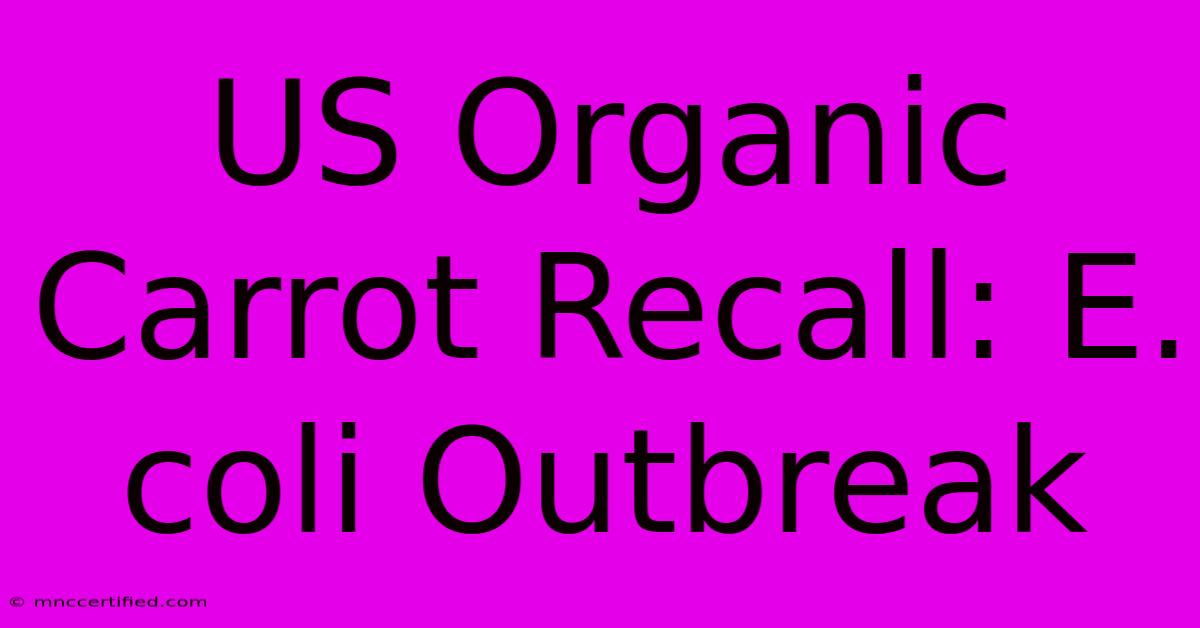US Organic Carrot Recall: E. Coli Outbreak

Table of Contents
US Organic Carrot Recall: E. coli Outbreak – What You Need to Know
A recent E. coli outbreak linked to organic carrots has prompted a significant recall across the United States. This article provides crucial information about the recall, the associated risks, and steps you can take to protect yourself and your family. We'll cover key details to ensure you're fully informed about this developing situation.
Understanding the E. coli Outbreak
The Centers for Disease Control and Prevention (CDC) and the Food and Drug Administration (FDA) are actively investigating a multi-state outbreak of E. coli O157:H7 infections. This specific strain is known to cause severe illness, including bloody diarrhea, stomach cramps, and vomiting. In some cases, it can lead to more serious complications like hemolytic uremic syndrome (HUS), a type of kidney failure. Children, the elderly, and individuals with weakened immune systems are at particularly high risk.
The investigation has traced the source of the outbreak to organic carrots distributed by [Insert Company Name Here, if known, otherwise remove this sentence and the next one]. This has resulted in a widespread recall of potentially contaminated products. This recall is not only impacting consumers but also businesses that use these carrots in their products.
Key Symptoms of E. coli O157:H7 Infection
If you've recently consumed organic carrots and are experiencing any of the following symptoms, seek immediate medical attention:
- Bloody diarrhea
- Severe stomach cramps
- Vomiting
- Fever (although fever is not always present)
Early diagnosis and treatment are crucial to prevent serious complications. Don't hesitate to contact your doctor if you have any concerns.
Identifying Recalled Carrots
The recalled carrots may vary in packaging and branding. Check your refrigerator and pantry for any organic carrots that match the description provided by the FDA and CDC. Their official websites are your best source for the most up-to-date information, including specific product codes and lot numbers. Look for announcements on their websites and social media channels.
What to Do If You Have Recalled Carrots
If you have any carrots matching the recall information, do not eat them. Instead:
- Discard them immediately. Do not compost them, as this could spread the bacteria.
- Thoroughly clean any surfaces that may have come into contact with the carrots. Use hot, soapy water and a disinfectant.
- Wash your hands thoroughly with soap and water after handling the recalled carrots or any contaminated surfaces.
Preventing Future E. coli Infections
This outbreak highlights the importance of food safety practices. To reduce your risk of E. coli infection:
- Wash your produce thoroughly under running water before consuming.
- Cook ground beef to an internal temperature of 160°F (71°C).
- Avoid cross-contamination by keeping raw meat separate from other foods.
- Wash your hands frequently with soap and water, especially after handling raw meat and produce.
Staying Informed about the Recall
The situation is rapidly evolving. Stay updated on the recall by regularly checking the websites of the:
- Centers for Disease Control and Prevention (CDC): [Insert CDC Website Link]
- Food and Drug Administration (FDA): [Insert FDA Website Link]
This information is for guidance only and should not be considered medical advice. Always consult with a healthcare professional for any health concerns. Remember to check official sources for the most accurate and up-to-date information on this ongoing recall. This dynamic situation requires vigilance and proactive measures to ensure your safety and the safety of your loved ones.

Thank you for visiting our website wich cover about US Organic Carrot Recall: E. Coli Outbreak. We hope the information provided has been useful to you. Feel free to contact us if you have any questions or need further assistance. See you next time and dont miss to bookmark.
Featured Posts
-
Contaminated Carrots Recalled E Coli
Nov 19, 2024
-
Insurance Companies Mount Airy Nc
Nov 19, 2024
-
Holiday Gifts Kansas City Chiefs
Nov 19, 2024
-
Ball Quits Bbc Radio 2 Breakfast Show
Nov 19, 2024
-
Pacific Insurance Company Limited
Nov 19, 2024